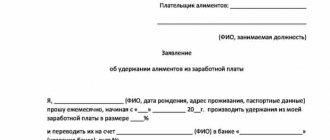Applications to bailiffs regarding arrears of alimony (sample)
The possibility of filing such an application is indicated in Article 50 of the Law “On Enforcement Proceedings”. The right to file an application arises only if the alimony payer does not fulfill his obligations or does not transfer the money in full.
How to compose
When drawing up an application of this type, the following information must be indicated in the document:
- The name of the bailiff service department to which the application is being submitted.
- Information about the applicant: Full name
- Registration and residence address (if different).
- Contact phone/phone numbers.
- On what basis are alimony payments required and when did it arise?
Documentation
Attached to the application:
- Applicant's passport.
- A court order or agreement to pay child support.
- Evidence that payments were made (or not made, as the case may be). For example, this may be a certificate from the bank about movements in the account of the alimony recipient.
Statement
Articles on the topic (click to view)
- Assignment of the right to claim under alimony obligations is possible
- Formula for calculating penalties and fines for alimony: sample
- What are the consequences of not paying child support in 2020?
- Criminal liability for non-payment of alimony under Art. 157 of the Criminal Code of the Russian Federation
- Is alimony from financial assistance withheld for vacation?
- Find out the debt by name from the bailiffs for alimony
- Reducing alimony debt over the past period
Further actions
Submitting such an application is just the beginning. After receiving the calculation of the debt, you need to go to court, get its decision on collecting the debt and penalties, transfer it to the bailiffs, and only then will they begin to fulfill their duties, look for the debtor, demand money from him, describe the property and try to collect the debt in any other legal way .
Legal status of participants in legal relations
Creditors and debtors must be aware that in order to achieve their goals, they must act through legal methods.
And if it is necessary to change the amount of penalties, contact the judicial authorities. Participants in alimony enforcement proceedings:
- collector - the person who initiated the alimony collection (recipient);
- debtor - a person obligated to pay money (payer);
- bailiff - an employee of the FSSP - an official carrying out enforcement actions.
Important!
According to Art. 48 FZ-229 “On Enforcement Proceedings”, other persons acting in pursuance of the requirements approved by the court (various types of specialists, representatives) may also take part in the collection process. The parties to enforcement proceedings in the course of relevant activities are endowed with a certain legal status. That is, they have rights and obligations regulated by law. They are needed:
- for collectors - to take timely measures and facilitate the receipt of payments;
- debtors - to avoid legal liability for late payments, non-payment, warnings, appeals against illegal acts;
- bailiffs - to perform legal actions within the assigned powers aimed at satisfying the property rights and interests of the claimant. Without infringing on the rights of other participants in the production.
Application to bailiffs for the collection of alimony (sample)
In the usual manner, immediately after the issuance of a court order on the need to collect alimony, the same document is automatically transferred to the bailiffs, who also automatically open the corresponding case. The recipient of the funds does not need to take any additional actions. However, if previously alimony was transferred by agreement of the parties and at some point the payer decides to violate its terms, then you can come to the bailiffs with this very agreement and write a statement to collect alimony.
The general principles of drawing up the document, its features and procedure are no different from the previous version. The only exception: you must attach to your application a copy of the alimony agreement that was concluded between the parties and was subsequently violated.
Application for non-payment of alimony to bailiffs (sample)
This application is usually a last resort and is submitted only if the payer deliberately evades payments, does not make contact with the bailiffs and the recipient of funds, hides and falsifies data. Such a document involves bringing an unreliable payer to criminal liability on the basis of Article 157 of the Criminal Code of the Russian Federation.
This is important to know: Termination of alimony payments for the maintenance of a former spouse if she returns to work
The principles for drawing up an application are identical to those described above. The only important point is the mandatory note that the applicant is familiar with Article 306 of the Criminal Code of the Russian Federation and fully understands the full responsibility for giving deliberately false testimony. That is, if he made a mistake unconsciously, it’s not so scary. But if he specifically presented the situation in such a light that the payer is almost an inveterate criminal, then he will be punished no more seriously than the payer (if he really did not transfer the money).
How to apply
An appeal to the bailiff department can be made in two ways:
- By personally writing it at the territorial branch of the bailiff service.
- By sending a letter by mail.
The first option gives more guarantees that the application will still reach the bailiffs, that it will be accepted and processed properly. However, in most cases, such statements have to be written to mothers with small children, and they do not always manage to get to the appropriate bailiff department. As a result, a more convenient (albeit riskier) option is to send an application by mail.
- The application has been lost.
- The document was compiled incorrectly and therefore will not be accepted.
- It will be necessary to clarify the information, and this will be difficult to do.
FREE CONSULTATIONS are available for you! If you want to solve exactly your problem, then
:
- describe your situation to a lawyer in an online chat;
- write a question in the form below;
Contacting the prosecutor's office
It is permissible to submit a complaint directly to the supervisory authority, bypassing other authorities. Sometimes this kind of treatment turns out to be the most effective. The assistance of the prosecutor may be needed not only in the absence of active actions on the part of the bailiff necessary to collect the accumulated debt from the “alimony holder”. If a civil servant allows himself to make rude statements, threats, insults or other similar actions, a complaint can help stop manifestations of rudeness.
If it is not possible to travel to the locality where the FSSP office is located, you can use the electronic portal of the Prosecutor General’s Office (https://ipriem.genproc.gov.ru/contacts/ipriem/). You will need to register and log in on the site. After sending the request, it will be immediately accepted and sent to the addressee.
Rice. 3 – Complaint to the prosecutor’s office about the inaction of bailiffs regarding alimony (sample)
Failure to pay child support
Alimony debt is the total amount of debt resulting from late alimony payments for a certain period (from the moment of the first non-payment of alimony until a decision is made on forced collection of debts).
Read more about how to file a complaint against a bailiff here.
As soon as the alimony debt reaches a large size, the recipient can apply to the magistrates' court to collect it. The appeal takes place in the form of a claim.
Lawyers recommend: Filing an application for non-payment of alimony simultaneously with a claim for the collection of a penalty for late child support payments and compensation for all expenses incurred in connection with the proceedings. More details - Article 115 of the Family Code of the Russian Federation.
At the end of the trial, the recipient receives a writ of execution to collect the debt from the debtor, which must be transferred to the territorial department of the Federal Bailiff Service.
When conducting enforcement proceedings, bailiffs may apply the following sanctions:
- Restriction of the right to travel abroad;
- Temporary deprivation of a driver's license for failure to pay child support;
- Fines;
- Arrests;
- Confiscation of property, etc.
If the debtor maliciously evades payment of the debt, bailiffs have the right to refer the case to court to bring the guilty person to criminal liability under Article 157 of the Criminal Code of the Russian Federation.
Procedure and consequences
Initially, the application to initiate proceedings is considered by the head of the specific department to which it was submitted. After that, it is sent to work alone and by specialists, depending on the territoriality. From the moment of filing the application to the transfer of it to the bailiff, a period not exceeding three days must pass.
Next, the debtor must be notified. This is done by sending him correspondence or during a personal meeting with the bailiff.
If the debtor refuses to fulfill his obligations voluntarily, then the stage of forced collection begins. The bailiff sends all necessary requests in order to determine the property status of the debtor and identify the place of his employment or the fact of receiving a pension and other payments from the state.
After this, the claimant can in some way influence the course of enforcement proceedings by submitting certain applications addressed to the bailiff:
- On the seizure of the debtor's property. This can be transport, real estate, as well as almost any property. If seizure control cannot be fully carried out (for example, when seizing household items or electronics), then the item can be transferred for safekeeping to the debtor himself. For the loss or sale of an object, the appropriate sanction will be applied.
- About the ban on traveling outside the Russian Federation. The ban is valid for six months. It may be extended further.
- On the collection of penalties for late payment. If the delay occurred against the will of the debtor, then it cannot be recovered.
After the bailiff receives funds from the debtor, they are credited to the deposit account of the bailiff service. After this, they are transferred to the collector to his account or by postal order.
Application for non-payment of alimony: registration and procedure for drawing up
Competently filling out a statement of claim reduces the time it takes for a magistrate to consider it.
Basic requirements for filling out a statement of claim for non-payment of alimony:
- The “heading” of the application is in the upper right corner of the claim: Full name and address of the magistrate’s court;
- Personal data of the plaintiff, defendant, as well as their legal representatives: full name;
- Status: plaintiff or defendant;
- Registration and permanent residence address;
- Contact details (phone, email).
- Official name documents by ;
- Descriptive part of the application: Abstract description of enforcement proceedings (type of alimony, payer, etc.);
- Date of assignment of alimony and debt collection;
- Evidence of non-payment of alimony: Resolution on the calculation of debt from the senior bailiff;
- Bank statement and certificate of non-payment of alimony, etc.
- Statement;
This is important to know: Exemption from payment of alimony for minor children under the Family Code of the Russian Federation
What rights and responsibilities do alimony providers and collectors have?
Despite the factual difference in the procedural position, the alimony payer and the claimant are legally equal in the scope of their rights.
Rights of alimony payers and collectors
The basic powers of debtors and collectors are reflected in Art. 50 FZ-229. These include:
- have information about the official in whose proceedings the case is under executive documents. Namely: personal data of the bailiff;
- his work or other contact phone number;
- visiting days and times.
- familiarization with the case materials (by reading, writing out, making copies);
- provision of additional documentation related to the case (certificates, acts, etc.);
- filing petitions (for the recusal of the bailiff, for the participation of a representative in the case, for the commission of any production actions);
- written oral explanations with arguments;
- written and oral objections regarding petitions, statements of other parties to the proceedings (for example, to limit special rights, conduct a search, involve specialists);
- appealing acts, acts of a bailiff;
- other rights related to enforcement proceedings.
Duties of the parties
The parties also have procedural responsibilities:
- fulfilling the requirements of officials conducting the proceedings, including: timely attendance when called;
- submission of the requested information (certificates, data, including personal);
- giving explanations;
- compliance with the norms of procedural ethics: avoidance of rudeness, rudeness, profanity in communication with FSSP employees and other participants in production;
- notification and petition for participation in the process of 3 persons: representatives, specialists, etc.
When may you need to calculate arrears of alimony?
Calculation of alimony debt may be necessary in several cases:
- The claimant wants to claim a penalty through the court or deprive the debtor of parental rights. According to Art. 69 of the RF IC, the formation of a large debt and recognition of the father as a willful defaulter is the basis for deprivation of parental rights, after which he will not be able to communicate with the child, claim his property during inheritance, or claim alimony from him when incapacity for work is established.
- The person obligated to pay alimony expresses a desire to pay off the debt on his own when the ex-wife does not apply for payment. A certificate may also be needed to reduce the penalty if there are appropriate grounds.
Alimony for the past period is calculated by the bailiff on the basis of the presented IL or agreement. For the calculation, average earnings in the Russian Federation for the last 3 years are taken if the debtor cannot provide information on wages for the specified period. In other situations, the size established by the IL or by agreement is used.
Who can apply?
The claimant or the debtor can submit an application for debt settlement.
The document can be sent in several ways:
- through your personal account on the FSSP website, if such a function is provided in the region;
- during a personal visit to the unit;
- By Russian Post by sending a registered letter with acknowledgment of delivery. The countdown of the period begins not from the moment of sending, but from the date of receipt of the FSSP letter.
It is worth considering that the resolution is issued by the bailiff who opened the proceedings (IP) or another authorized person in his temporary absence. Other FSSP employees do not have the right to draw up the document.
When can they refuse?
The grounds for rejecting an appeal by the head of the FSSP are specified in Article 125 of the Federal Law “On Enforcement Proceedings”. Reasons for refusing to accept a complaint may be:
- failure to comply with the 10-day period, which is calculated from the moment the fact of inaction is established;
- the complaint contains incomplete information about the applicant and does not contain his residential address;
- the court has already made a lawful decision on a similar appeal;
- The text does not indicate the personal data (last name, first name, patronymic) of the bailiff, whose inaction is being disputed.
Expert opinion
Elena Vladimirovna
Bailiff for the Petrogradsky district of St. Petersburg, work experience - 3 years
If the document is rejected, the head of the FSSP body issues a decision within three days to refuse to consider the application. It can be challenged in a district court or appealed to the chief bailiff at the regional level.
The servant of Themis also has the right to refuse to accept an administrative claim. A ruling on rejection can be made if it is established that the circumstances set out in the text do not indicate inaction on the part of the bailiff, as well as a violation of the interests of the recipient of alimony. The complaint will not be accepted if there is already a decision on this issue made earlier (Article 128 of the CAS RF).
How to obtain a debt settlement order?
The procedure for applying to the bailiffs for a ruling is as follows:
- The claimant or debtor fills out an application for the issuance of a document and submits it to the FSSP.
- The appeal is registered and received by the bailiff within 3 days. He is given 10 calendar days for settlement.
- The citizen who applies receives a notification that the resolution is ready or comes to the FSSP for it himself.
Subsequently, a settlement of the debt is submitted to the court.
Where to contact
The resolution is drawn up by the bailiff, the leading individual entrepreneur. If for some reason a citizen cannot appear at the FSSP in person, he has the right to send an application by registered mail or ask his legal representative to submit it, having previously issued a notarized power of attorney.
How to make an application?
There are no strict requirements for the application, and it can be filled out in any form, the main thing is to reflect the necessary information:
- name of the FSSP;
- Full name, bailiff position;
- Full name, registration address, date of birth of the claimant and debtor;
- date of initiation of the IP, series and number of the corresponding resolution;
- information from the alimony agreement or court order, if payments are collected under it;
- date of last payment;
- the amount of alimony established by a court decision or agreement;
- period of non-payment (exact dates are indicated);
- request for debt settlement;
- date of registration and signature.
Documentation
When contacting the bailiff, it is enough to provide an alimony agreement, IL or a court order on the basis of which alimony is collected. You will also need a passport.
State duty
The claimant is exempt from paying state fees when filing an application for calculation of alimony debt. Instead, the debtor is required to pay the enforcement fee for each debt separately.
The money can be returned to the debtor upon cancellation of the decree, judicial act or executive document.
Terms of consideration
Applications are accepted by authorized FSSP employees. Citizens' appeals are registered, and information about them is entered into a special journal. 3 calendar days are allotted for this.
After 3 days, the documents must be handed over to the bailiff. The decision to determine the debt is issued within 10 days, a copy of it is sent to the parties to the proceedings immediately or no later than the next day after its issuance.
Reasons
The basis for contacting the bailiff service with an application to initiate proceedings is the presence of a writ of execution, which can be:
- Performance list. Issued on the basis of a court decision (after the decision enters into legal force).
- An agreement that must be notarized. Otherwise, it will not have legal force. The agreement is certified by any notary and may contain various information, including the frequency of payments, conditions for termination of the obligation, and so on.
- Court order. Issued on the basis of an application for an order, which is submitted to the magistrates. It is worth remembering that the order is not issued if there is a dispute about the right in the case (for example, it is necessary to establish paternity or determine alimony in a fixed amount).
The writ of execution is issued after the judicial act comes into force. Before the decision comes into force, the parties have the right to appeal it on appeal. After joining, an appeal will be possible only due to newly discovered circumstances.
Appealing a decision on debt calculation
According to Art. 122 Federal Law No. 229, the claimant or debtor is given 10 days to appeal from the moment the resolution is issued. It often happens that the parties do not know about its issuance due to lack of proper notification, and then the period is calculated from the date of receipt of the information.
You can appeal the decision in several ways:
- filing a complaint about the actions or inaction of the bailiff to a senior manager of the FSSP;
- sending an administrative claim to court.
Reasons for appeal
The reason for the appeal is underestimation or overestimation of the amount of debt. The debtor can also reduce it in court if there are good reasons for the debt:
- long-term absence from work due to layoff;
- the need for expensive treatment of the payer, receipt of disability;
- an increase in the number of dependents in the family of the person receiving alimony;
- use of unreliable indicators when calculating debt.
This is important to know: The statute of limitations for collecting alimony
Additional factors may also be present:
- personal interest of the bailiff in relation to the debtor or collector;
- inaction of the bailiff when searching for the income or property of the alimony payer;
- use of incorrect terms of non-payment when calculating;
- debt accounting without indexation of alimony.
Let's look at a practical example:
The debtor's ex-wife decided to collect from him a penalty and the principal debt for 1 year. To do this, she turned to the bailiff with a statement.
How to file a complaint?
The requirements for the content of the complaint are reflected in Art. 124 Federal Law No. 229. It includes the following information:
- position, full name of the bailiff;
- Full name, registration addresses of the claimant and debtor;
- information about IL;
- requirement to appoint debt recalculation;
- date of registration and signature of the applicant.
Legal status of a bailiff
The activities of FSSP employees within the framework of enforcement proceedings are regulated by Art.
64 FZ-229. Download for viewing and printing: Federal Law of October 2, 2007 No. 229-FZ on enforcement proceedings
What activities can bailiffs carry out?
It includes:
- calling collectors and debtors to an appointment (or their authorized representatives) by telephone, summons, or other legal means;
- requesting information from both parties and third parties - enterprises, organizations, state and municipal bodies in relation to participants in legal relations. Including personal data;
- taking explanations from the parties, requesting background information;
- verification activities, including those related to financial documentation;
- drawing up instructions regarding the requirements of executive documents;
- enter the residential and non-residential premises of debtors in the performance of official duties.
Attention! To gain access to the property, the bailiff must present an official ID and written confirmation of the right to such actions. The document must be signed by a senior bailiff.
- arrest, seizure, assessment of payers' property;
- joint activities with the Department of Internal Affairs to place debtors and their property on the executive wanted list;
- consideration of received applications and petitions from participants in proceedings. If such documents are relevant,
- introduction of temporary restrictions on the travel of debtors outside the Russian Federation and the use of special rights (for example, to receive government services),
- other actions facilitating enforcement proceedings.
Responsibilities of federal bailiffs
The duties of a bailiff include:
- use of legal powers within the scope of ongoing activities;
Important! In this case, infringement of the rights of any of the participants in the proceedings and abuse of authority are not allowed.
- a ban on disclosing personal and family secrets that became known to an FSSP employee during work procedures;
- carrying out activities exclusively within the framework of enforcement proceedings;
- complete lack of personal interest;
- actions are consistent with the standards of professional ethics;
- a comprehensive scope of measures in compliance with established deadlines.
Attention! In case of FSSP employees evading mandatory actions due to their illegal actions, participants in enforcement proceedings have the right to appeal such unlawful behavior of officials.
How to appeal a decision in court?
An appeal against a decision is carried out within the framework of administrative proceedings. The claim is sent to the district court at the location of the FSSP.
- The plaintiff files a claim drawn up taking into account the requirements of Art. 124 CAS RF. It must contain the name of the defendant, information about the contested decision, claims to invalidate the document and to order a new recalculation.
- Within 3 days, the judge makes a decision to accept the statement of claim for proceedings. Copies are sent to all parties.
- The case is considered within 2 months. This period includes preparation for proceedings.
- At the end of the trial, a decision is made in the deliberation room.
An extract from the decision is transmitted to the parties. Representatives of the FSSP are usually present at the meetings.
What to do after receiving a court decision?
Having received a court decision, the claimant or debtor submits it to the FSSP for execution. The deadline for fulfilling the requirements is indicated in the document.
With further inaction, it is allowed to re-file an administrative claim, but this time due to failure to comply with the requirements of the court decision. The defendant here is not the representative of the FSSP, but the bailiff himself.
Based on the results, he may be brought to administrative responsibility, and the head of the FSSP may be subject to disciplinary action: he may be reprimanded, reprimanded, or fired if such offenses have been observed by the bailiff more than once.
In some cases, criminal liability arises under Art. 315 of the Criminal Code of the Russian Federation, if damage was caused to the plaintiff by inaction. What penalties are possible:
- disqualification for 5 years;
- forced labor for up to 2 years;
- compulsory work up to 480 hours;
- imprisonment for up to 2 years;
- arrest for up to six months.
The verdict on criminal liability is passed by the district court - the lawsuit should also be filed there.
Appeal to the manager
To file a complaint with the head of the FSSP department, it is better for a woman to find out the office hours in order to personally meet with the head of the body. The paper will need to be written in legible handwriting. You can print the appeal using a computer. To avoid refusal to accept a document, you need to know what information it should contain. The text includes:
- full name of the institution;
- personal data of the applicant, his contact phone number;
- information about the bailiff who initiated enforcement proceedings;
- date of filing the initial application, existence of grounds for receiving alimony;
- signs indicating the employee’s inaction, available evidence;
- requirement to take urgent measures (to recover money, to punish the perpetrators);
- applicant's signature, date.
Rice. 1 – Complaint about the inaction of the bailiff (sample)
How to calculate the penalty for alimony?
Most often, a decree on the calculation of debt is required to collect a penalty. According to recent changes in legislation, its size has been reduced from 0.5 to 0.1% of the total debt.
How to calculate correctly:
- The date for making the last payment is determined.
- An application for debt settlement is submitted to the bailiff.
- The FSSP employee draws up a resolution indicating the amount of debt and the number of days overdue.
- Based on the resolution, the creditor multiplies the amount of the debt by the penalty - 0.1%. The amount received means a penalty for 1 day of delay. It is multiplied by the total number of days of non-payment.
- The principal debt and penalty are summed up. The demand for payment of the amount is indicated in the statement of claim with a detailed description.
Let's look at a practical example:
30 x 60 = 1800 rub. – penalty for the entire period.
Arbitrage practice
In cases of challenging bailiff decisions, judicial practice is ambiguous. Most often, claims are not satisfied for the following reasons:
- failure by debtors to provide information on income during the period of debt formation; accruals will be made based on average earnings;
- lack of grounds for appeal;
- absence of valid reasons for missing the deadline for filing a complaint.
Each case is considered individually in court.









